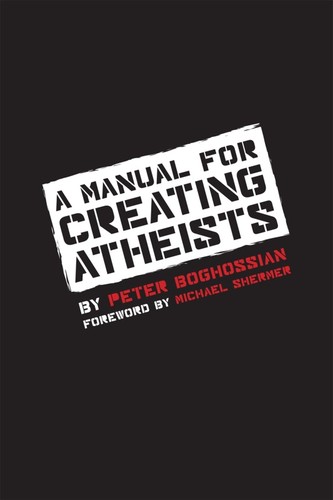- Rating
- Category
- non-fiction
- Read
- 2013-12-30
- Pages
- 278
The best book on teaching critical thinking I have read. Includes “intervention dialogues” transcripts, plenty of research, genuine compassion and empathy for believers, plus a wealth of experience in the author (who has been teaching philosophy and talking about faith for decades).
Boghossian relentlessly focuses on attacking faith as a means of attaining truth, not attacking relgion: “Reasoning away faith means helping people to abandon a faulty epistemology, but reasoning away religion means that people abandon their social support network.”
“Bringing facts into the discussion is the wrong way to conceptualize the problem: the problem is with epistemologies people use, not with conclusions people hold.”
And this rather lengthly paragraph: “Religion is a social experience (Höfele & Laqué, 2011, p. 75; Moberg, 1962). Religious structures (churches, mosques, synagogues, temples) are places where people come together in friendship, love, trust, and community to do things that are fun, meaningful, and satisfying, that are perceived to be productive, or that grant solace. Communal celebrations of life milestones—birth, adulthood, marriage, death—are also significant social experiences. In church, for example, many people make new friends, play bingo in community halls, engage in casual sports with a team, sing songs with their friends and with strangers, date, etc. This is how the vast majority of believers experience their religious life—as a communal and social event that adds meaning, purpose, and joy to their lives (Argyle, 2000, p. 111). Attacks on religion are often perceived as attacks on friends, families, communities, and relationships. As such, attacking religion may alienate people, making it even more difficult to separate them from their faith. One of my students asked me if a person could be rational and go to church. I responded, “Can one be rational and sing songs? And read poetry? And play games? And read ancient texts? Of course. One can do all of these things and be rational.” Religion is not necessarily an insurmountable barrier to reason and rationality. The problem is not that people are reading ancient texts. I read Shakespeare with my son. I don’t, however, think that Iago, Hamlet, and Lear were historical figures. I also don’t derive my ultimate moral authority from Shakespeare’s works. I don’t want to kill people who have rival interpretations of Shakespeare’s plays. Nor do I attempt to bring Othello into decisions at the ballot box.”
